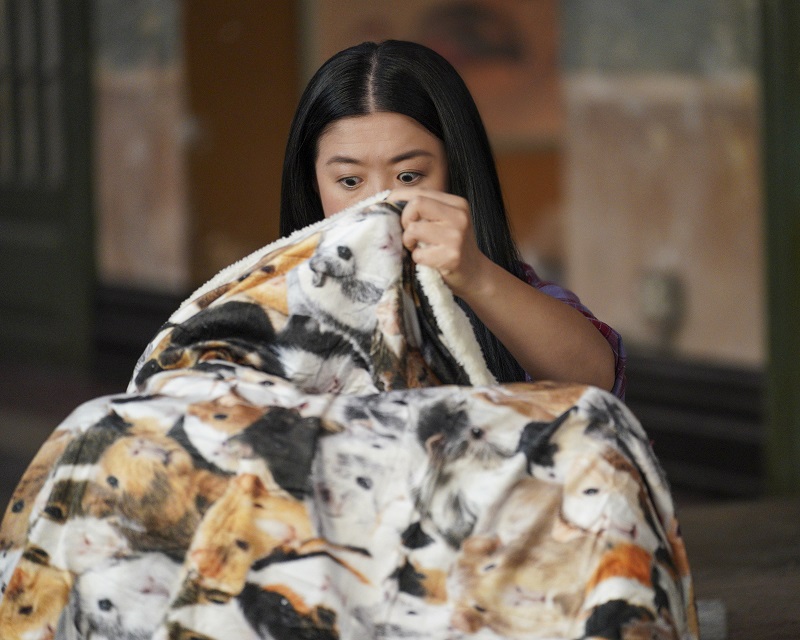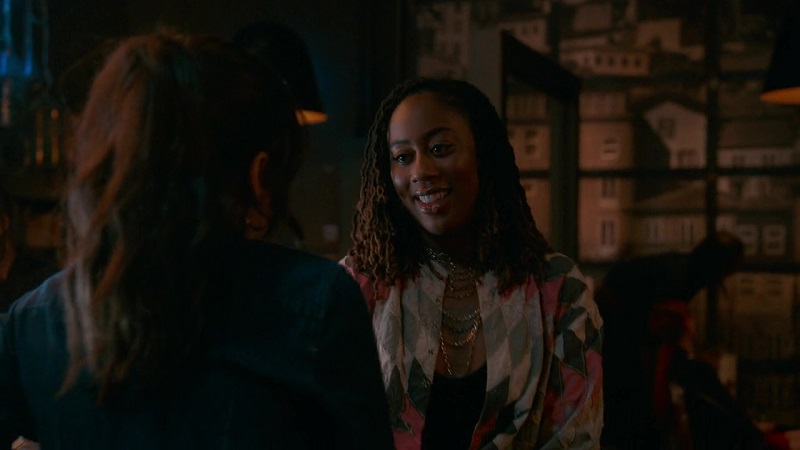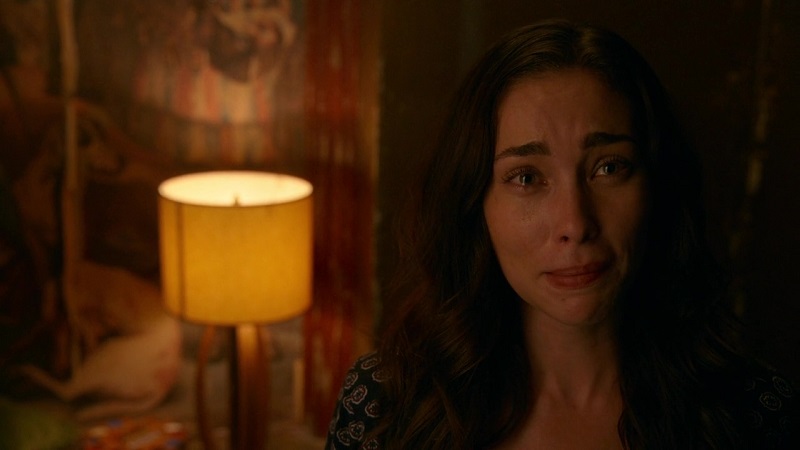Just inside the Coterie doors, there’s a sign that tells residents and visitors about the type of space they’re entering. It says, “The Coterie at the Palace is an intentional community where we share resources to enrich our lives and the lives of others by cultivating friendship, social progress and artistic expression.” Inside those walls, the residents of the Coterie eat together, share facilities and utilities and find a chosen family among friends. That’s the spirit of this place — no one is alone — and it’s a message that’s punctuated firmly by Good Trouble this week.
“Just remember: Someone is on your side, someone else is not/ While you’re seeing our side, maybe you forgot/ They are not alone, no one is alone,” Davia sings at the request of her his school music teacher. But while the message is there — and it’s been there throughout our time in the Coterie — there’s a difference between knowing you’re not alone and being willing to accept the help that’s being offered.

To wit, we catch up with Alice and Sumi in bed together, still caught up in the honeymoon stage of their newly rekindled relationship. Sumi collapses against her pillow, sated from Alice’s performance. She takes a minute to congratulate Alice on the incredible sex and then slides beneath the covers to return the favor. Alice pulls Sumi back towards her and asks that they cuddle for just a second.
“Don’t you want me to…” Sumi asks, trailing off as she again tries to slide beneath the covers, only to be stopped again by her girlfriend. Alice insists that she’s good — totally satisfied — and then slides out of bed to put on some pants. She reminds Sumi about Kelly’s salon on “personal inventory” and assures her that she’ll enjoy the session. The response underscores how uncomfortable Alice is in this moment: a desperate attempt to take the focus off of herself (and sex) and put it on, literally, anything else…even if that anything else is the notoriously unpredictable Kelly.
The salon turns out to be a personal inventory about sexual pleasure and, when the moderator announces it, poor Alice looks like a deer caught in headlights. Everyone else is excited to talk about pleasure and labias in the public space but Alice is mortified by the prospect. Even just writing down her fantasies in a notebook — a step towards being able to articulate them to your partner, the moderator explains — is too much for Alice. Instead, she doodles in her journal.
Sumi, on the other hand, has no such issue. When it comes time to vocalize their fantasies to the group, Sumi shares that she wants to “feel her legs squeeze my head as she shouts my name in ecstasy.” OKAY, SUMI. But when it’s Alice’s turn, she admits that her fantasy is fast-forwarding to the end of the salon. The group takes Alice’s joke in stride and just moves onto their next activity: vagina gazing. Once again, the moderator circles the group to ask the participants for their thoughts as they look at their vaginas in a mirror beneath a blanket (Kelly’s is a Twilight blanket, natch). Everyone else comes up with powerful descriptions of their vagina — beautiful, soft, hungry and happy — but when Alice looks at hers, she sees an ape, tumbleweeds and a cowboy and a venus flytrap. She admits that all she feels is confused.
I should pause here and note that this is an uncomfortable conversation and Alice’s discomfort at being forced into it is apparent on-screen. But what Alice is experiencing isn’t unusual. We don’t live in a society that values female sexual pleasure. And, in particular, women who come from conservative communities and cultures bring those conservative values — about gender roles and the value of sex — into the bedroom. Unpacking and unlearning all that is uncomfortable…which is why we don’t talk about it and which is why television doesn’t showcase it. I appreciate Good Trouble stepping out and addressing it. People need to see it, women need to see that they’re not alone.
Later, Sumi tries to talk to Alice about what happened at the salon and Alice resists having the conversation. Alice insists that she doesn’t need a workshop on sexual pleasure because she derives her pleasure from pleasuring Sumi. But Sumi pushes back: she wants that opportunity too. Alice doesn’t understand why things have to change…when they were together before, Sumi was fine with being a pillow princess. Sumi admits that she was selfish back then and now she just wants to give her girlfriend an orgasm. Alice assures Sumi that she already has but it’s clear that she’s lying. Sumi pushes her for the truth and eventually Alice confesses: she’s never had an orgasm with another person.
Sumi links their hands together and says, “I would really love it if I was the one you trusted enough to be your first and your last and your only…if you’d just give me a chance.”
Alice recoils from Sumi’s request and insists that they talk about something — anything — other than this. Sumi retreats back to her end of the couch but it’s clear this issue isn’t going away any time soon.

Meanwhile, Malika delivers the episode’s message to the unhoused population that’s living in an encampment on the property that was slated to become her women’s center.
The young staffer has been working doggedly to prepare for an upcoming pitch meeting to secure money for permanent housing for LA’s homeless. Her boss interrupts to check on her progress but then pivots to ask about Angelica. She insists she’s only asking because her propensity to work long hours is what drove them apart and, oddly enough, I believe her. But the question clearly makes Malika uncomfortable so instead of telling Angelica’s ex the truth, she lies and says things between them are great.
Later, she heads over to Duoro and to talk to Angelica about her lie. She wonders if Angelica will keep the news of their breakup a secret for a little bit longer. She admits that Lucia asked about it and she just wants to keep the news on the down low until the women’s center garners approval from the City Council. Angelica agrees but wonders if it’s healthy for Malika to work for someone who’s looking for an excuse to fire her. Malika admits that it’s not but it’s a sacrifice she’s willing to make to bring the women’s center to fruition. Angelica laments that Malika’s undervaluing herself and pushes her to trust that she’s an assest to Lucia.
Admittedly, this is not the first conversation I wanted Malika and Angelica to have, post-breakup, but it’s clear the love between them is still there. In fact the chemistry between them might be as palpable as it was the first time they kissed at Duoro. Malika admits that she misses Angelica and Angelica confesses that she misses Malika too…but then she promptly gets up to leave, maybe fearing that too much time together might weaken her resolve to stay broken up.
Back at work, Malika makes her presentation to the Los Angeles Homeless Services Authority (LAHSA), with Luca, Tracy and Marquis Jet looking on. She highlights the humanity of the city’s unhoused population and notes the community that’s been built in the encampments. She points out that her proposal to buy a pre-existing apartment building would be much cheaper than their current proposal to build something from scratch. She even acknowledges her own history of having been unhoused for a year before finding stability at the Coterie. In short, she pulls out all the stops…and, of course, LAHSA still says no.
“I won’t stop trying,” Malika tells the population of the encampment after learning about the decision. “I mean, I promise you, here and now, I’m not going to let them use the excuse of building my women’s center here to drive you out. You have my word.”
I recoil in that moment because she sounds more like Malika Williams, the activist, and not Malika Williams, the City Council staffer. You can’t — you shouldn’t — make promises like that a political staffer…it’s akin to a doctor promising someone that they’ll definitely save their family member’s life. So much is out of your control. And sure enough, when she returns to the office, Lucia offers to make her women’s center a reality…as long as its built on where the encampment stands. Before Malika goes off to ponder what she’s willing to sacrifice to bring the Center to reality, she pauses at the door and tells Lucia the truth about her relationship with Angelica. Lucia admits that she’s sorry to hear that…and, again, I believe her. I wonder if this is what Wallace Shawn (AKA William Halsey) felt like when Adele convinced him to wrestle control of “Lez Girls” from Jenny.
Malika asks Lucia not to ask about her personal life going forward and her boss acquiesces…but I’m left wondering how long this will last.

Coincidentally, there’s a portion of “No One is Alone” that doesn’t get sung this week: the part about how people make mistakes, even our mothers and fathers, because they think they’re alone. It’s a message that both Gael and Isabella might have benefitted from hearing.
After their fight last week, Gael decides he needs some time and space to think. He packs a bag and leaves the loft for the night. While Isabella insists that she understands his impulse, it’s clear that even the short departure feeds into her fears of abandonment and ultimately makes the situation worse, not better. Still concerned about Isabella’s well-being, though, Gael asks Dennis to check in on the expectant mother. I’m not sure that helps either, particularly after she learns that Gael didn’t tell Dennis that he’d asked Isabella to get married. She wonders if his proposal just another thing that Gael has taken back — like his love — and Dennis insists that Gael’s not the type to fall in and out of love…which frankly, makes me wonder if Dennis has watched the first two seasons of this show.
“What if my baby doesn’t love me?” Isabella asks.
Dennis notes that it’s not about the love that a parent gets from a baby — all they know how to do is “eat, sleep, poop and look cute” — but about the love that’s given to that child. He confesses that, as a parent, you have to be prepared to put the child first and not expect anything in return. And that’s the problem, right? Because Isabella wants…no, Isabella needs…this baby to fill this hole that’s been inside her for so much of her life. Dennis acknowledges that kids don’t fix what’s broken inside their parents, they just reveal what inside. Sometimes that’s good, sometimes that’s bad but it is always revealed.
With Gael gone, Isabella is left alone with her thoughts…but it’s her mother’s thoughts that permeate. Isabella hears the worst: she was always an annoyance to her mother, she doesn’t really love Gael, she latches onto anyone who will show her any attention, she’s a potential danger to her child, Gael will leave her eventually. It’s all just a nightmare but those messages sink in and when Gael’s not back the next morning, she panics, as though the worst has been confirmed. She runs to Dennis for comfort and all I can think is, “why won’t anyone tell Isabella that she needs help?”
By the time, Gael returns, he’s determined to make things work but Isabella’s mother’s voice has taken over. She confesses that she no longer knows whether she truly loves Gael and expresses doubt that she knows how to love anyone. Finally, she comes around to her parents point of view: they should put the baby up for adoption.
Good Trouble Coterie Sundries
+ Given the nature of this site, I feel like I should have more to say about the Bulk Beauty storyline but, honestly, I just found it to be comically bad. At one point, Mariana laments that Zelda “[unmasks] herself like a Scooby Doo villain,” and all I can think is “why is the show writing Zelda like a Scooby Doo villain?” In the last episode, Zelda seemed perplexed by the idea that people other than women have periods but now she’s spouting TERF propaganda like she’s been studying it for years? Also, as a general rule, I’m annoyed by shows that don’t consider the racial dynamics of a situation before injecting an issue into a storyline…and Good Trouble is usually better about it than this.
But, just so we’re clear: for me and my house, it’s fuck TERFS, forever and always.
+ Throughout the back half of this season, I’ve been lamenting how much Davia’s current path — as a teacher for a privileged homeschool kid — feels divorced from her arc over Good Trouble‘s run. This week, though, the show revisits something that’s been part of her character’s story since the beginning: her toxic relationship with her mother.
Davia returns to her hometown for the funeral services of her favorite teacher from high school. She tries to avoid her mother — she doesn’t even call her to let her know she’s coming, in fact — but the two cross paths at the funeral. Bonnie remains every bit as toxic as she’s ever been, pairing even the mildest of compliments with a criticism of her daughter. But thankfully Davia isn’t the same girl as she was…the one who carried the emotional weight of her mother’s critiques and channeled it into unhealthy habits (her affair with Jeff or disordered eating). She’s closer to the woman her high school music teacher always thought she could be. She’s learned to love her body and, more importantly, to set personal boundaries.
Bonnie half-heartedly apologizes for not being the perfect mother but Davia insists she never asked for that. All that she ever wanted, Davia tearfully confesses, was for her mother to love her just the way that she was. Instead of listening to her mother’s pleas to continue the painful conversation, Davia climbs into her car to go to head back to the airport, “I can’t take care of you this time, I have to choose me for once!”
+ That said, before I give Davia too much credit for her willingness to set boundaries, she’s coming ever so closer to violating her professional boundaries by considering a relationship with the father of the kid she’s homeschooling. Even the kid notices the closeness between them this week and gives her the okay to pursue a romantic relationship. She doesn’t even bother to correct the kid in the moment…which is how you know this whole thing is about to go sideways.
Next Week: “Do you ever think about mom when you’re having sex?” Wait, what?!



Now that they’re actually fleshing out what Isabella’s whole deal is I find her so much more understandable. I’d say she is experiencing Borderline Personality Disorder.
For a second I thought this show might remember that they were supposedly about representation of our community, from an insider’s view. But apparently they are ready to throw stone dykes under the bus in favor of passing politics and woe is me. It’s disappointing, but not the first time this season they’ve shown they really think the message is that straight psychology works for everybody, and queer people are bland and boring and sad and damaged and deep down fit into all the straight norms, just with different shaped genitals. It’s disturbing and sad.